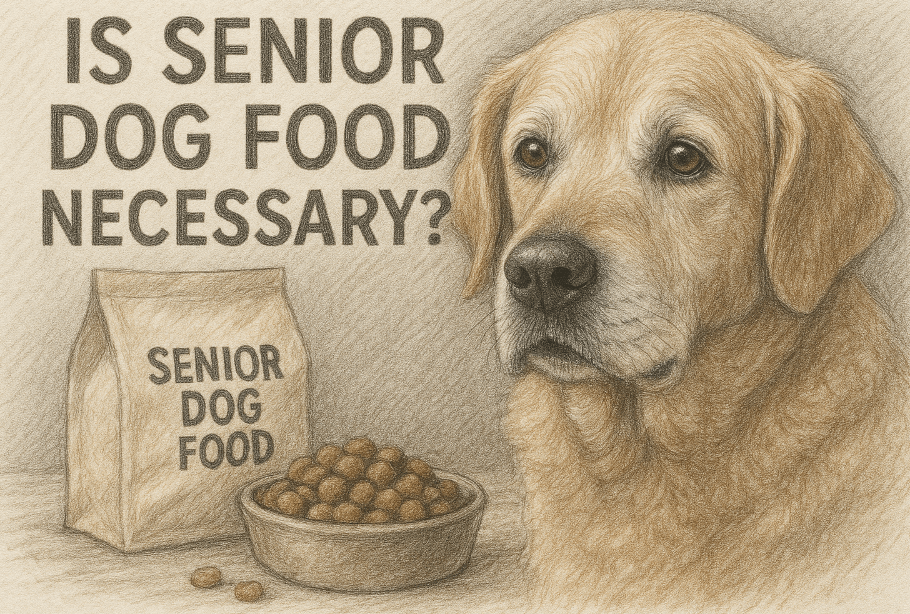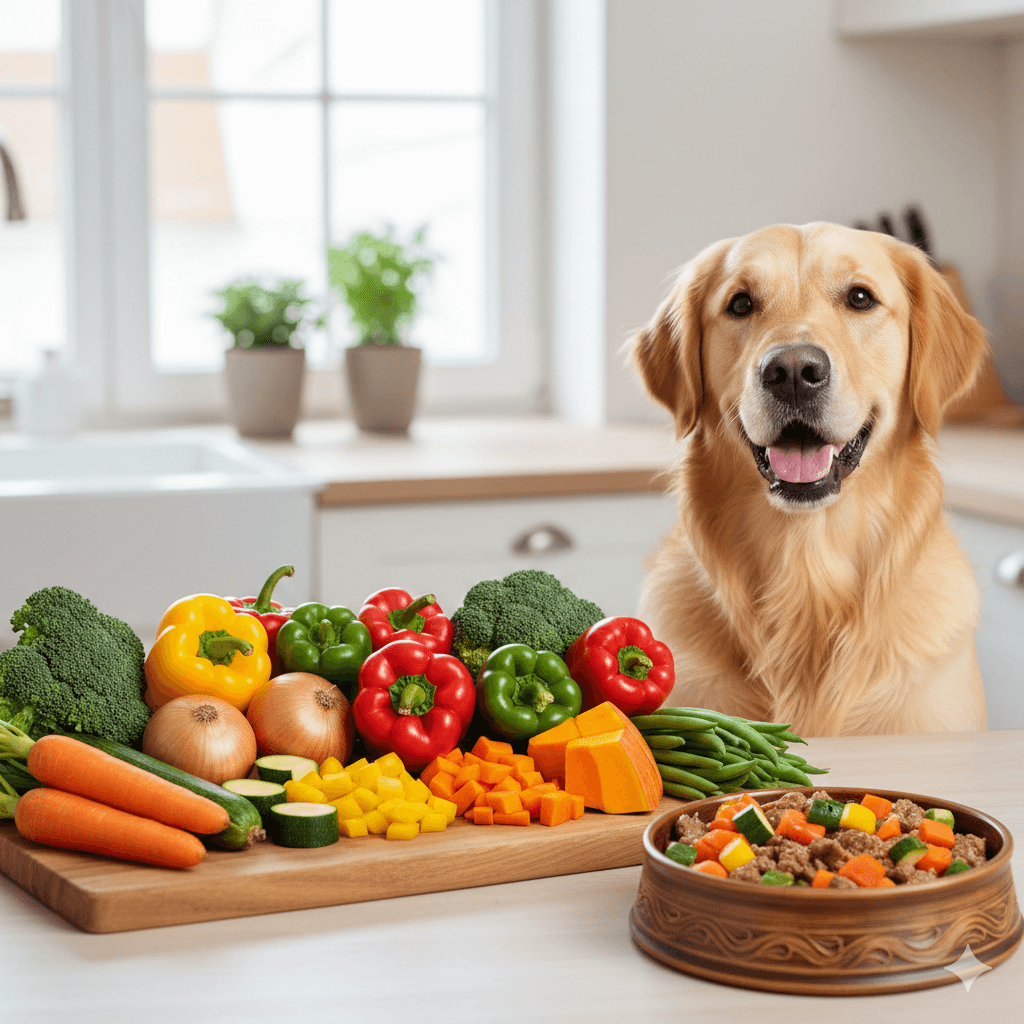Is Senior Dog Food Necessary?
As our beloved canine companions grow older, their nutritional needs inevitably change. Just like humans, senior dogs require a diet tailored to their aging bodies to support their health and well-being. But is senior dog food truly necessary, or can they continue eating the same food they’ve always enjoyed? With so many options on the market, it’s essential to understand whether switching to senior dog food is beneficial or simply a marketing gimmick. In this blog post, we’ll explore the science behind senior dog nutrition, its advantages, and how to make informed decisions for your aging furry friend.
Why Senior Dog Food May Be Beneficial
Senior dog food is formulated specifically to meet the unique dietary requirements of aging dogs. Here are some reasons why it might be worth considering for your older pup.
Lower Calorie Content:
Older dogs tend to be less active, making them prone to weight gain. Senior dog food often contains fewer calories to prevent obesity.Joint Health Support:
Many senior formulas include ingredients like glucosamine and chondroitin to promote joint health and mobility in aging dogs.Easier Digestibility:
Senior dog food is typically made with highly digestible proteins and fibers to accommodate a slower metabolism and sensitive stomachs.Reduced Sodium Levels:
Lower sodium content helps support heart and kidney health, which can become compromised in older dogs.Enhanced Nutrient Balance:
Senior formulas often provide increased levels of antioxidants, omega-3 fatty acids, and other nutrients to boost immunity and overall vitality.
Switching to senior dog food can address age-related health concerns and ensure your dog receives the right nutrients for their stage of life.
Signs Your Dog May Need Senior Dog Food
How do you know if it’s time to transition your dog to senior-specific food? Look out for these signs that indicate their current diet may no longer be sufficient.
Weight Gain or Loss:
If your dog is gaining weight despite reduced activity or losing weight without explanation, their nutritional needs may have changed.Decreased Energy Levels:
A noticeable decline in energy could signal a need for food with adjusted calorie and nutrient levels.Joint Stiffness or Mobility Issues:
Difficulty getting up, climbing stairs, or walking may indicate a need for joint-supporting ingredients found in senior dog food.Dull Coat or Skin Problems:
Poor coat condition or frequent skin irritations can suggest deficiencies that senior formulas are designed to address.Changes in Appetite or Digestion:
If your dog seems less interested in meals or experiences digestive upset, a more digestible formula might be necessary.
Recognizing these signs early allows you to adjust their diet proactively and support their long-term health.
Check this guide 👉Why Some Dog Breeds May Not Be Ideal for Seniors: Top 7 Tips
Check this guide 👉Adult vs Senior Dog Food: Best 7 Expert Tips!

Benefits of Senior Dog Food | Potential Drawbacks of Senior Dog Food |
|---|---|
Tailored nutrient profiles for aging dogs | Not all senior foods are high-quality |
Supports joint and mobility health | Some dogs may not need a diet change |
Easier digestion for sensitive stomachs | Can be more expensive than regular food |
Helps manage weight gain or loss | Over-reliance on marketing claims |
Boosts immune system and overall vitality | May not suit every individual dog’s needs |
How to Transition to Senior Dog Food Safely
Switching your dog’s food should always be done gradually to avoid digestive upset. Follow these steps to ensure a smooth transition.
Introduce Gradually Over 7-10 Days:
Start by mixing a small amount of senior food with their current food, increasing the proportion daily until fully switched.Monitor for Allergic Reactions:
Watch for signs of allergies, such as itching, vomiting, or diarrhea, during the transition period.Consult Your Veterinarian:
Seek professional advice before making any dietary changes, especially if your dog has pre-existing health conditions.Observe Changes in Behavior:
Pay attention to how your dog responds to the new food, including energy levels, appetite, and stool consistency.Stick to High-Quality Brands:
Choose reputable brands that prioritize quality ingredients and avoid fillers or artificial additives.
A thoughtful approach ensures your dog adapts well to their new diet while reaping its benefits.
Alternatives to Traditional Senior Dog Food
If you’re hesitant about switching to senior dog food, there are alternative ways to meet your aging dog’s nutritional needs.
Homemade Meals:
Preparing balanced homemade meals allows you to control ingredient quality and tailor portions to your dog’s specific needs.Supplements for Joint Health:
Adding supplements like fish oil, glucosamine, or turmeric can complement their existing diet and support joint function.Limited Ingredient Diets:
These diets reduce the risk of food sensitivities and are ideal for dogs with digestive issues or allergies.Raw Food Diets:
Some owners opt for raw diets, which mimic the natural eating habits of dogs but require careful planning to ensure nutritional balance.Customized Meal Plans:
Services that create personalized meal plans based on your dog’s age, weight, and health status offer a convenient alternative to store-bought food.
These alternatives provide flexibility while addressing the unique needs of senior dogs.
Common Misconceptions About Senior Dog Food
Many pet owners have misconceptions about senior dog food, leading to confusion about its necessity. Here’s what you need to know.
“All Senior Dogs Need Special Food”:
Not every senior requires a diet change; some remain healthy on their current food. Individual needs vary widely.“Senior Food Is Just Marketing”:
While some products may overpromise, reputable brands base formulas on scientific research to address age-related health concerns.“It’s Too Expensive to Be Worth It”:
Investing in quality food can reduce future vet costs by preventing or managing chronic conditions.“My Dog Won’t Like the Taste”:
Many senior formulas are palatable and designed to appeal even to picky eaters.“One Formula Fits All Seniors”:
Every dog is different; what works for one may not suit another, so customization is key.
Understanding these truths helps dispel myths and encourages informed decision-making.
Tips for Maintaining a Senior Dog’s Overall Health
Nutrition is just one piece of the puzzle when caring for a senior dog. These tips will help you support their overall well-being alongside dietary adjustments.
Regular Vet Check-Ups:
Schedule routine exams to catch potential health issues early and adjust care plans accordingly.Daily Exercise:
Keep your dog active with low-impact activities like short walks or swimming to maintain muscle tone and joint flexibility.Mental Stimulation:
Puzzle toys, scent games, and interactive play keep their minds sharp and engaged.Comfortable Living Spaces:
Provide soft bedding and easy access to favorite spots to accommodate reduced mobility.Dental Care:
Brush their teeth regularly and schedule cleanings to prevent gum disease, which can affect overall health.
Holistic care ensures your senior dog stays happy and comfortable throughout their later years.
How to Spot Low-Quality Senior Dog Food
Not all senior dog foods are created equal. Learning to identify poor-quality options will help you choose wisely for your aging companion.
High Fillers and By-Products:
Avoid foods with excessive corn, wheat, soy, or meat by-products, which lack nutritional value.Artificial Additives:
Steer clear of foods containing artificial colors, flavors, or preservatives like BHA and BHT.Generic Ingredients:
Vague terms like “meat” or “animal fat” indicate unclear sourcing and lower quality.Insufficient Protein Content:
Senior dogs still need adequate protein; ensure the first ingredient is a named, high-quality protein source.Excessive Carbohydrates:
Too many carbs can lead to weight gain and blood sugar imbalances in older dogs.
By avoiding these red flags, you can select a nutritious and effective senior dog food that supports your pet’s health.
Frequently Asked Questions About Senior Dog Food
When should I switch my dog to senior food?
Most dogs transition to senior food around 7 years old, but this varies by breed and size. Consult your vet for guidance.
Can I mix senior food with regular food?
Yes, mixing can help ease the transition, but ensure the overall diet remains balanced and meets their nutritional needs.
Do all senior dogs need special food?
No, some healthy seniors may thrive on their current diet, but others benefit from targeted formulas.
What should I look for in senior dog food?
Prioritize high-quality protein, joint-supporting ingredients, and balanced nutrients tailored to aging dogs.
Is senior dog food more expensive?
It can be pricier due to specialized ingredients, but investing in quality food often saves money on vet bills in the long run.
Prioritizing Your Senior Dog’s Nutrition
Feeding your senior dog the right food is one of the most impactful ways to support their health and happiness in their golden years. While senior dog food isn’t mandatory for every aging pup, it offers valuable benefits for many. By understanding your dog’s unique needs, consulting your veterinarian, and exploring various options, you can provide a diet that keeps them thriving. Remember, your love and care—combined with proper nutrition—will ensure your senior dog enjoys their later years to the fullest.
Can a Cat Be Tested for Rabies? Best 7 Expert Tips! – Learn if testing is possible, understand the process, and discover prevention tips to keep your cat safe from rabies.
Can a Dog Be Tested for Rabies? Best 7 Expert Tips! – Learn how rabies testing works, why it’s critical, and what every dog owner needs to know.
Best Vegetables for Cat Food: Best 7 Expert Tips! – Discover safe, nutritious veggies to boost your cat’s diet, support digestion, and enhance overall health naturally.
Best Vegetables for Dog Food: Best 7 Expert Tips! – Discover safe, nutritious veggies to boost your dog’s diet, support digestion, and enhance overall health naturally.




